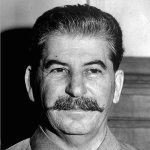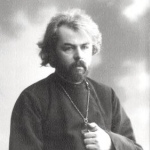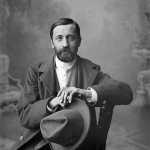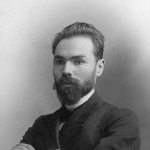Background
Iona Panteleimonovich Brichnichev was born on June 15 (27), 1879 in Tiflis (modern Tbilisi, Georgia). His father was a blacksmith. He spent his youth in Georgia.

Tbilisi Spiritual Seminary
priest publicist publisher poet
Iona Panteleimonovich Brichnichev was born on June 15 (27), 1879 in Tiflis (modern Tbilisi, Georgia). His father was a blacksmith. He spent his youth in Georgia.
Iona Panteleimonovich got his primary education at the Kutaisi Parish School. His classmate was Joseph Dzhugashvili (aka Joseph Stalin). Some scientists say that Iona Panteleimonovich did not graduate from college, as he was expelled due to illness after the sixth grade. At the age of 14, he became a student at the Tbilisi Spiritual Seminary. Graduating from it, he was ordained.
After the graduation from Tbilisi spiritual seminary, Iona Panteleimonovich received a parish in the village of Pasanauri, and a few years later he was transferred to the temple in Tiflis.
The revolutionary events in the Caucasus at the beginning of 1906 became the impetus for the beginning of Iona's literary, journalistic, and propaganda activities. In his Open Letters, he condemned the Black-Hundred wing of the clergy and protested against the forcible Russification of foreigners. In the spring of the same year, Iona Panteleimonovich began to publish the newspaper Get up, Dormant!. In his articles, he combined political radicalism with religiosity and tried to show the anti-Christian nature of a society based on ownership, inequality, and violence. The newspaper was repeatedly banned, but he renamed it, continuing his activities. In the summer of 1906, he was arrested and sent to the Ryazan province and defrocked. During the exile, Iona Panteleimonovich became close to the participants of the Moscow religious-philosophical society: V. Sventsitsky, Bishop Mikhail Starobryadsky, V. Ern, G. Petrov, D. Merezhkovsky and Z. Gippius.
After the exile, Iona Panteleimonovich moved to Rostov-on-Don, where he became the publisher and collaborator of several "populist" newspapers and magazines. Many of them were quickly banned by censorship. It is known that these media were popular with a democratic reader and had a great influence on people.
In the fall of 1910, Iona Panteleimonovich moved to Moscow. He became close to Golgotha Christians. This sect was a socialist branch of Christianity and believed that the path to salvation lies through self-sacrifice. In 1912, he created the New Land newspaper, which became the voice of the Golgotha Christians. Iona Panteleimonovich tried to attract symbolist writers (V. Bryusov, A. Blok) to work for the newspaper, but their participation was episodic. On the other hand, in New Land N. Klyuyev published a significant part of poems, which were later included in the collections Pine Chime and Brotherly Songs.
In 1913, Iona Panteleimonovich was expelled from Moscow and left for the south of Russia. A year later, with the support of V. Bryusov, he published a collection of poems Universal Matter. The main theme of Iona's lyrics is the prophets-martyrs, which lead to the path of universal salvation and immortality, as well as universal love. It is also worth noting that poems of Brichnichev have numerous characteristic stamps of symbolic and democratic poetry.
Iona Panteleimonovich welcomed the October Revolution. Almost immediately, he became a member of the Bolshevik party and published the Proletarian Collection of poems, in which he glorified V. Lenin. He worked for the People's Commissariat for Education, the All-Russian Committee for the Liquidation of Illiteracy, and headed the Gomel department of public education. In 1921 he moved to Georgia, where he was engaged in the propaganda of revolutionary ideas. In a pamphlet entitled Patriarch Tikhon and His Church, published in 1923, Iona Panteleimonovich sharply condemned the ROC, accusing it of counter-revolutionary activity. Iona also justified the campaign of seizing church property. In 1924-1925 he became secretary of the Central Council of the Union of Militant Atheists. In 1925, due to a conflict with the chairman of the Anti-Religious Commission, E. Yaroslavsky, Brichnichev was expelled from the party.
In 1928-1929 Iona Panteleimonovich worked for the People's Commissariat of Kazakhstan, but after retiring he returned to Moscow. Since 1932 he became a member of the Belarusian Academy of Sciences.
After graduating from the seminary, Iona Panteleimonovich received the title of Orthodox priest. Later, he became interested in the ideas of Golgotha Christianity: this sect tried to connect the faith and ideas of socialism. In the twenties, he spoke with active criticism of the Russian Orthodox Church.
Iona Panteleimonovich reacted positively to the October Revolution. He worked for many years in government agencies, mainly engaged in educational programs. He also actively supported the seizure of church property.
Iona Panteleimonovich had numerous acquaintances in different spheres, ranging from poets and writers to priests of various faiths. Because of the active propaganda of Christian ideas, for many of Brichnichev's friends, his post-revolutionary godlessness was an unpleasant surprise.
Quotes from others about the person
The biographer of V. Pavlov: "Iona Brichnichev complained to Pavlov about the extremely distressful situation of his family:
- I’m sick, brother, for several days, - said Brichnichev quietly, not getting out of bed. - We lack food, sometimes we even don't have a loaf of bread on the table.
- By many sorrows must we enter the Kingdom of God, - Pavlov comforted his friend. - In God's eternal dwellings there will be no crying, no illness, no death.
Saying goodbye to the Brikhnichevs, Pavlov opened his wallet and, pulling out everything from the modest money reserves, left it to the suffering family."
It is known that Iona Brichnichev had a family. But there is no exact data about his wife or children.




